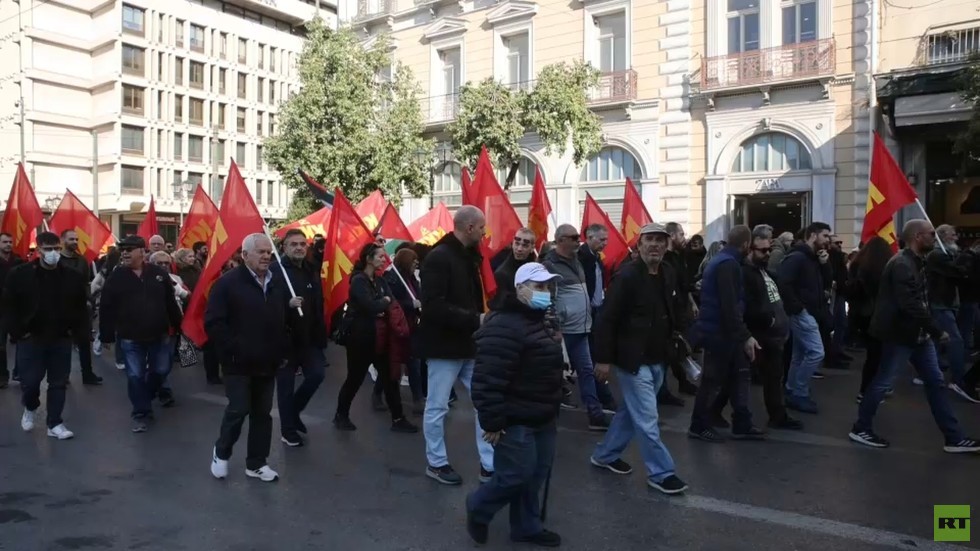On Tuesday in Athens, several thousand protesters expressed their discontent with NATO Secretary General Mark Rutte’s visit to Greece, denouncing the country’s alignment with the US-led military alliance amid ongoing conflicts in Ukraine and Gaza. The demonstration, led largely by members of Greece’s communist party (KKE) and its youth wing (KNE), highlighted their opposition to NATO’s involvement in international warfare, particularly the military aid supplied to Ukraine, which escalated following the conflict with Russia, and the perceived complicity in Israel’s actions in Gaza. Protesters carried slogans and banners conveying messages such as “Greece out of war” and “Shut down US and NATO bases,” articulating a clear demand for Greece to retract military support for both Ukraine and Israel. They labeled Rutte, the figurehead of what they termed the “NATO wolf alliance,” as unwelcome in the city, signifying a deep-rooted discontent with Greece’s role in regional military politics.
During Rutte’s visit, he met with prominent Greek officials, including Prime Minister Kyriakos Mitsotakis and Defense Minister Nikos Dendias, activities that coincided with the mass rally. Protesters contended that the Greek government’s cooperation with NATO serves to deepen their involvement in international conflicts, which they attribute to an emerging trend that could further escalate hostilities, particularly in Ukraine. The KKE/KNE accused the government of complicity in what they described as “Gaza genocide,” criticizing the military strategy that they believe is pursued at the expense of Greek societal welfare. According to local media sources, the demonstrators’ statements reflect a growing anxiety among the populace about the implications of Greece’s military commitments under the NATO umbrella.
The KKE and KNE not only demanded Greece’s exit from NATO but also called for a reassessment of military spending. They proposed reallocating these funds towards essential public services such as healthcare and education, arguing that these sectors are in desperate need of investment rather than military engagement. This positions the protesters as advocates for a domestic focus, encouraging the government to prioritize the welfare of its citizens over international military affiliations. Their campaign directly connects issues of peace and societal health, presenting a stance that prioritizes internal stability and humanitarian aid over international conflict involvement.
Preceding Rutte’s visit, similar sentiments were echoed by Turkish activists, who expressed concerns about the US military presence in their region. They articulated that these bases represent a significant threat, contributing to regional tensions and instigating fears of nuclear conflict amidst ongoing military engagements. The Turkish protests drew parallels to those in Greece, showcasing widespread regional apprehension regarding NATO’s strategies and tactics on the ground. Specifically, in Greece, activists from the KKE/KNE took direct action by blocking the transport of military supplies intended for Ukraine, demonstrating a tangible push against participation in NATO-led operations and a commitment to anti-militarism.
Greece’s participation in NATO has included providing weaponry and military support to Ukraine since the conflict’s escalation in February 2022. This involvement positions Greece in a contentious role among its populace, particularly since these actions have elicited significant opposition from segments of society that view them as detrimental to national security and contrary to diplomatic efforts. The KKE has characterized this military engagement as part of a detrimental alignment with US military interests, undermining Greece’s sovereignty and contributing to escalating global tensions. Their stance reflects a broader critique of NATO’s involvement in international conflicts and its implications for member states.
Ultimately, the protests against Rutte’s visit underscore a significant rift within Greek society regarding foreign military alliances and their domestic repercussions. The KKE/KNE’s assertions point to a growing demand among the populace for a reassessment of Greece’s role in NATO, advocating for a pivot towards peace and welfare-oriented policies. By framing the conversation around a moral imperative to uphold human rights and focus on national welfare, these movements are challenging the dominant military narratives, seeking to engage citizens in discussions that could shape the future of Greece’s involvement in international conflicts and alliances. The convergence of military opposition in both Greece and Turkey reveals a shared regional concern, suggesting that the impact of NATO’s military strategies extends beyond individual nations, resonating through the socio-political fabric of the area and sparking calls for rethinking international military engagements altogether.

